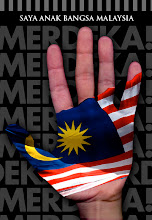It is a fact that literacy has a significant role in building healthy societies,with a strong emphasis on epidemics and communicable diseases like HIV,tuberculosis and malaria.These are ,in fact, some of the world`s important health concerns of today.
In Malaysia,literacy is often taken for granted since primary school enrolment rates are above 90%.This is because children between ages 4-6 attend pre-school set up by the government,non-government agencies and the private sector.In 2003, a national pre-school curriculum for children 4-6 years old was made compulsory for pre-schools. The contributing factor is that Malaysians abide while service providers comply.
There is compulsory free primary and secondary education for all in Malaysia.That is another success for our literacy level.For the post-secondary education, Form 6 or matriculation programes are pursued in preparation for entrance to public universities while diploma-level programmes are been offered by private colleges and polytechnics in preparation for entrance to private universities or the job market. It is heartening to know that everyone knows a quality basic education equips pupils with literacy skills for life and further learning.
The good news is that according to the 2000 census,more than 91% of the population (above 10 years who are attending or had attended school) are literate.There have been also great improvement in education for the Orang Asli children--26,911 children were enrolled in primary school in 2006. A special education program was implemented in 2003 to provide uniforms, fees, books,writing materials and transportation to school, as well as train qualified Orang Asli individuals as teachers.The literacy rate among indigenous communities, measured in 2001, was 51%
So much for our literacy achievement in these 51 years of history and today we Malaysians , are proud to say we have produced a new generation of educated literates--the so called-generation Y who are IT savvy , fast track and who believe tertiary education is their human rights.It is consoling to know too that Malaysia is said to be paying increasing attention to the need for a life skilled based education systems as a response to modernisation challenges and emerging issues.The issues raised include the place of religion or moral values in our education systems.All literacy efforts so far were to ensure that there are literate- graduates who can be employable,marketable,competitive and so on.The result is that the numbers of higher education institutions have increased exponentially-both in the public and private sectors.Liberals call this the `democratisation of education`.
But sad to say can literacy be the best remedy for educating young people for flexibility and adaptability in this economical and technological revolution? They have lose the ability to reason,think and analyse.They have lose the capacity to distinguish between knowing and understanding.They have also lose their capacity to cultivate the essence of the art of learning for life- long skills. Is this literacy we want for our generation Y? It has become a rising social concern for many today? Ever wonder who is this generation Y-learn something new from the posting below!!
Politics 101 MalaysiaFriday, 29-08-2008Generation YPosted:11:38 Aug-29-2008
The Y Generation.
I've always wondered what this was. Now I know.
The Silent generation, people born pre WW2.
The Baby Boomers, people born between 1946 and 1959. (Growing up to Rock n Roll, Elvis and ganja.)
Generation X, people born between 1960 and 1979. (That's me, yeah!)
Generation Y, people born between 1980 and 1995. (Xbox babes, Starbucks, and many Anwar supporters)
Why do we call the last one Generation Y? Is it because they ask important questions?
I am not sure, but a caricaturist explains it quite well below.

However we should not despair too much . Not all is lost yet because there are many initiatives in place by the government , NGOs and UNICEF Malaysia to arrest this problem.For instance, did you know the Supplementary Reading Programme (SRP) was initiated to reach vulnerable communities in Sabah and Sarawak so that the children in these commuinities have the learning reources required for quality education?
Did you know in 2007, UNICEF and Ministry of Education Curriculum Development Centre piloted a programme incorporating Orang Asli folklore to encourage school attendance of children from these communities while promoting local heritage and cultural knowledge.Statistcs show that 34% of these pupils failed to make it to secondary level while 46% failed to reach form 5. Absenteeism and dropout rates still remain a huge issue among the Orang Asli children.
UNICEF is collaborating with Ministry of Education and MERCY Malaysia to strengthen emergency preparedness programmes for children and teachers living in areas that are prone to natural disasters. UNICEF is also working with Ministry of Education and Ministry of Health to introduce a Life Skills-based education (LSBE) programe for schools to ensure effective delivery of lessons on HIV and AIDS. For your information, in December 2007 statistics from the Ministry of Health reveal that 36 % of the 80,938 HIV cases are amongst young peole between 13-29 years old. This is `what I say ~teach them to read,write and change their lives` -said UNICEF Representative to Malaysia Mr.Youssouf Oomar
`Fulfilling children`s right to education leads to the realisation of other rights for them-the right to be healthy and free of HIV infection,the right to be protected against drugs and violence, and the right to what is best for them ` he added.
Let us hope our children of the future generations would not only be literate but well-educated enough to be better informed and useful people as education and literacy are keys to growth in both developed and developing nations.
`The ablility to read and write allows children to benefit from education,to develop knowledge and behaviours to ensure good health, and to acquire skills to contribute to the enhancement of national capacity.It is,in fact,development`s most basic building block.` This is what I call literacy ,the best remedy for our nation`s unity, building, integrity and independence for the decade.













No comments:
Post a Comment